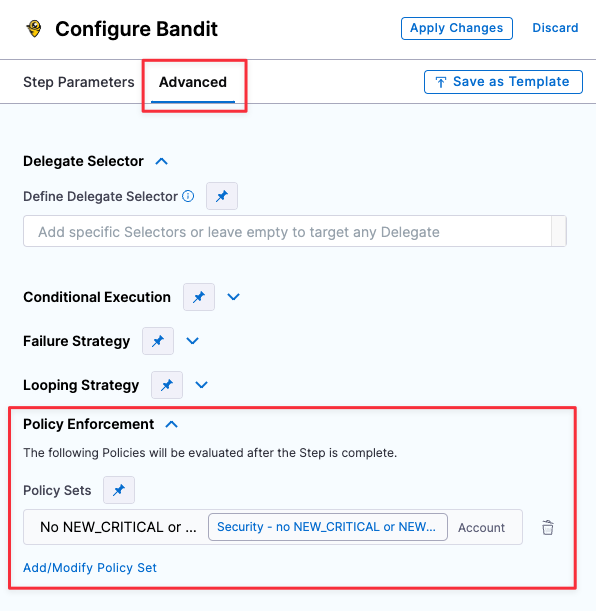Use governance policies and security scan results to stop pipelines automatically
This workflow requires a basic knowledge of governance policies and how to implement them using Harness Policy as Code and Open Policy Agent (OPA).
Whenever you run a scan, Harness collects output variables that capture the number of issues detected at each severity. These variables also track "new" issues were found in the current scan but not in the baseline or in the previous scan. For more information, go to:
In this workflow, you create a simple OPA policy for the pipeline: If the scan detected any NEW_CRITICAL or NEW_HIGH severities, exit the build with an error and send an email.
Create the OPA policy
Go to Account Settings (left menu) > Policies.
Click Policies (top right) and then New Policy.
Name the policy Security no NEW_CRITICAL or NEW_HIGH issues.
In the Edit Policy window, enter the following OPA code:
package pipeline_environment
deny[sprintf("Scan can't contain any NEW_CRITICAL vulnerability '%s'", [input[_].outcome.outputVariables.NEW_CRITICAL])] {
input[_].outcome.outputVariables.NEW_CRITICAL != "0"
}
deny[sprintf("Scan can't contain any high vulnerability '%s'", [input[_].outcome.outputVariables.NEW_HIGH])] {
input[_].outcome.outputVariables.NEW_HIGH != "0"
}Click Save.
Create a policy set
A policy set is a collection of one or more policies. You combine policies into a set and then include it in a Policy step.
In the Policies Overview page, click Policy Sets (top right) and then New Policiy Set.
Click New Policy Set. The Policy Set wizard appears.
Overview:
Name = Security Set - Block on Issue Severity
Entity type this policy applies to = Custom
On what event should the policy be set to = On Step.
These settings allow you to apply the member policies to a specific step, which you'll define below.
Policy evaluation criteria:
Click Add Policy.
Select the policy you just created and set the pull-down to Error and Exit. This is the action to take if any policies in the set are violated.

Click Apply to add the policy to the set, then Finish to close the Policy Set wizard.
❗ In the Policy Sets page, enable Enforced for your new policy set.

Enforce the policy in your scan step
Now you can set up your scan step to stop builds automatically when the policy gets violated.
Go to the scan step and click Advanced.
Under Policy Enforcement, click Add/Modify Policy Set and add the policy set you just created.
Click Apply Changes and then save the updated pipeline.

Set up email notifications for pipeline failures
You have a Policy that fails the pipeline based on an OPA policy. Now you can configure the stage to send an email notification automatically whenever the pipeline fails.
Click Notifications (right-side menu). The New Notification wizard appears.
Set up the notification as follows:
Overview page — Enter a notifcation name such as Pipeline failed -- NEW_CRITICAL or NEW_HIGH issues detected.
Pipeline Events page — Select Stage Failed for the event that triggers the notification. Then select the stage that has the Policy step you just created.
Notification Method page — Specify Email for the method and specify the recipient emails.
YAML pipeline example
The following pipeline includes both of these notification workflows. For every successful scan, it sends an automated email like this:
"STO scan of sto-notify-test v3 found the following issues:
Critical : 1
New Critical : 0
High: 0
New High: 0
Medium: 0
New Medium: 0
See https://app.harness.io/ng/#/account/XXXXXXXXXXXXXXXXXXXXXX/sto/orgs/default/"
If the scan finds any NEW_CRITICAL or NEW_HIGH issues, it stops the build and sends an email like this:
Stage Block_on_New_Critical_and_New_High_issues failed in pipeline notification_examples_pipeline
triggered by D*** B***
Started on Tue Mar 21 16:42:09 GMT 2023 and StageFailed on Tue Mar 21 16:42:11 GMT 2023
Execution URL https://app.harness.io/ng/#/account/XXXXXXXXXXXXXXXXXXXXXX/sto/orgs/default/projects/myProject/pipelines/stonotifyexample_-_v3/executions/XXXXXXXXXXXXXXXXXXXXXX/pipeline
2s
Here's the full pipeline. Note that the policy and policy set are referenced, but not defined, in the pipeline itself.
pipeline:
name: sto-notify-example v3
identifier: stonotifyexample_-_v3
projectIdentifier: myProject
orgIdentifier: myorg
tags: {}
properties:
ci:
codebase:
connectorRef: MY_GITHUB_CONNECTOR
build: <+input>
stages:
- stage:
name: banditScanStage
identifier: banditScanStage
description: ""
type: SecurityTests
spec:
cloneCodebase: true
execution:
steps:
- step:
type: Bandit
name: Bandit_1
identifier: Bandit_1
spec:
mode: orchestration
config: default
target:
name: dvpwaScanStep-v3
type: repository
variant: <+codebase.branch>
advanced:
log:
level: info
infrastructure:
type: KubernetesDirect
spec:
connectorRef: MY_DELEGATE_CONNECTOR
namespace: sto-lab
automountServiceAccountToken: true
nodeSelector: {}
os: Linux
- stage:
name: Block on New-Critical and New-High issues
identifier: Block_on_New_Critical_and_New_High_issues
description: ""
type: Custom
spec:
execution:
steps:
- step:
type: Email
name: emailOnNotification
identifier: Email_1
spec:
to: john.smithh@myorg.org
cc: ""
subject: "STO ALERT: Issues found in <+pipeline.name>"
body: |-
"STO scan of <+pipeline.name> found the following issues: <br>
Critical : <+pipeline.stages.banditScanStage.spec.execution.steps.Bandit_1.output.outputVariables.CRITICAL> <br>
New Critical : <+pipeline.stages.banditScanStage.spec.execution.steps.Bandit_1.output.outputVariables.NEW_CRITICAL> <br>
High: <+pipeline.stages.banditScanStage.spec.execution.steps.Bandit_1.output.outputVariables.HIGH> <br>
New High: <+pipeline.stages.banditScanStage.spec.execution.steps.Bandit_1.output.outputVariables.NEW_HIGH> <br>
Medium: <+pipeline.stages.banditScanStage.spec.execution.steps.Bandit_1.output.outputVariables.MEDIUM> <br>
New Medium: <+pipeline.stages.banditScanStage.spec.execution.steps.Bandit_1.output.outputVariables.NEW_MEDIUM> <br>
See https://app.harness.io/ng/#/account/MY_ACCOUNT_ID/sto/orgs/default/"
timeout: 1d
- step:
type: Policy
name: Policy_1
identifier: Policy_1
spec:
policySets:
- account.Security_Set_Block_on_Issue_Severity
type: Custom
policySpec:
payload: |-
{
"NEW_CRITICAL": <+pipeline.stages.banditScanStage.spec.execution.steps.Bandit_1.output.outputVariables.NEW_CRITICAL>,
"NEW_HIGH": <+pipeline.stages.banditScanStage.spec.execution.steps.Bandit_1.output.outputVariables.NEW_HIGH>
}
timeout: 10m
failureStrategies: []
tags: {}
notificationRules:
- name: example sto test
identifier: example_sto_test
pipelineEvents:
- type: StageFailed
forStages:
- Block_on_Critical_and_High_issues
notificationMethod:
type: Email
spec:
userGroups: []
recipients:
- john.smithh@myorg.org
enabled: true